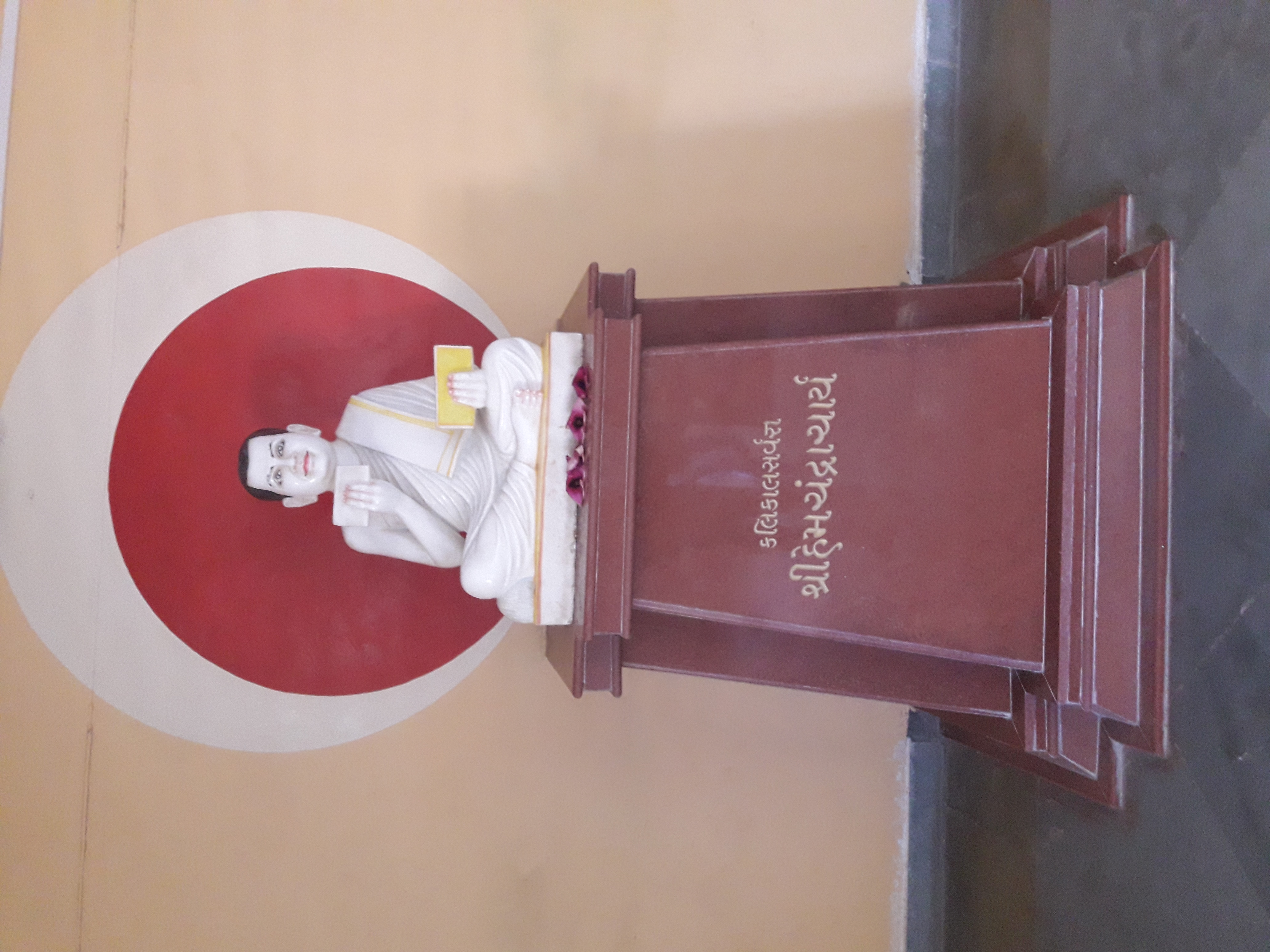|
Devardhigani Kshamashraman
Devardhi or Vachanacharya Devardhigani Kshamashramana or Devavachaka was a Jain ascetic of the Śvetāmbara sect and an author of several Prakrit texts. He was a prominent figure in Jainism in the ''5th century AD''. Mainly known for his contributions to the compilation and preservation of the canonical Jain literature, Jain scriptures, he is one of the most revered ascetics of the Śvetāmbara sect of Jainism. It was under his guidance that the second council of Vallabhi was held to preserve the remaining canonical texts of Jainism. Apart from the compilation of the canonical texts, he has been revered for his spiritual teachings as well. Early life Devardhigani was born in the Kshatriya caste of the Kashyap (caste), Kashyap gotra (family lineage). According to a legend, Mahavira had told ''Saudharmendra (demi-god in Jainism)'' in a holy assembly in Rajgruhi city,"Harinaigmeshin transferred me during my state of embryo from the womb of Devananda to the womb of Trishala and a ... [...More Info...] [...Related Items...] OR: [Wikipedia] [Google] [Baidu] |
Jainism
Jainism ( ), also known as Jain Dharma, is an Indian religions, Indian religion whose three main pillars are nonviolence (), asceticism (), and a rejection of all simplistic and one-sided views of truth and reality (). Jainism traces its spiritual ideas and history through the succession of twenty-four , supreme preachers of ''dharma''. The first in the current time cycle is Rishabhadeva, who tradition holds lived millions of years ago; the 23rd is Parshvanatha, traditionally dated to the 9th century Common Era, BCE; and the 24th is Mahāvīra, Mahavira, who lived . Jainism is considered an eternal ''dharma'' with the guiding every time cycle of the Jain cosmology, cosmology. Central to understanding Jain philosophy is the concept of ''bhedavijñāna'', or the clear distinction in the nature of the soul and non-soul entities. This principle underscores the innate purity and potential for liberation within every Jīva (Jainism), soul, distinct from the physical and menta ... [...More Info...] [...Related Items...] OR: [Wikipedia] [Google] [Baidu] |
Uttaradhyayana
Uttaradhyayana or Uttaradhyayana Sutra is one of the most important sacred books of Jains. It consists of 36 chapters, each of which deals with aspects of Jain doctrine and discipline. It is believed by some to contain the actual words of Bhagwan Mahavira (599/540 - 527/468 BCE) - the 24th Tirthankara in Jainism. See also * List of Jain texts Jain literature () refers to the literature of the Jain religion. It is a vast and ancient literary tradition, which was initially transmitted orally. The oldest surviving material is contained in the canonical ''Jain Agamas'', which are wri ... References Citations Sources * * * *''Uttarādhyayanasūtra'', in Pupphabhikkhū (ed.), ''Suttāgame'', vol. 2, Gurgaon, 1954. External links * Jacobi, Hermann (trans., 1895), ''Jaina Sutras, Part II: The Uttarâdhyayana Sûtra; The Sûtrakritâṅga Sûtra''. (Oxford: The Clarendon Press). Available asacred-texts.comand thWisdom Library Jain texts {{Jainism-book-stub ... [...More Info...] [...Related Items...] OR: [Wikipedia] [Google] [Baidu] |
5th-century Indian Monks
The 5th century is the time period from AD 401 (represented by the Roman numerals CDI) through AD 500 (D) in accordance with the Julian calendar. The 5th century is noted for being a period of migration and political instability throughout Eurasia. It saw the collapse of the Western Roman Empire, which came to a formal end in 476 AD. This empire had been ruled by a succession of weak emperors, with the real political might being increasingly concentrated among military leaders. Internal instability allowed a Visigoth army to reach and ransack Rome in 410. Some recovery took place during the following decades, but the Western Empire received another serious blow when a second foreign group, the Vandals, occupied Carthage, capital of an extremely important province in Africa. Attempts to retake the province were interrupted by the invasion of the Huns under Attila. After Attila's defeat, both Eastern and Western empires joined forces for a final assault on Vandal North Africa, but t ... [...More Info...] [...Related Items...] OR: [Wikipedia] [Google] [Baidu] |
Indian Jain Monks
Indian or Indians may refer to: Associated with India * of or related to India ** Indian people ** Indian diaspora ** Languages of India ** Indian English, a dialect of the English language ** Indian cuisine Associated with indigenous peoples of the Americas * Indigenous peoples of the Americas ** First Nations in Canada ** Native Americans in the United States ** Indigenous peoples of the Caribbean ** Indigenous languages of the Americas Places * Indian, West Virginia, U.S. * The Indians, an archipelago of islets in the British Virgin Islands Arts and entertainment Film * ''Indian'' (film series), a Tamil-language film series ** ''Indian'' (1996 film) * ''Indian'' (2001 film), a Hindi-language film Music * Indians (musician), Danish singer Søren Løkke Juul * "The Indian", an unreleased song by Basshunter * "Indian" (song), by Sturm und Drang, 2007 * "Indians" (song), by Anthrax, 1987 * Indians, a song by Gojira from the 2003 album '' The Link'' Other uses ... [...More Info...] [...Related Items...] OR: [Wikipedia] [Google] [Baidu] |
Prakrit Literature
Indian literature refers to the literature produced on the Indian subcontinent until 1947 and in the Republic of India thereafter. The Eighth Schedule to the Constitution of India has 22 officially recognised languages. Sahitya Akademi, India's highest literary body, also has 24 recognised literary languages. The earliest works of Indian literature were orally transmitted. Sanskrit literature begins with the oral literature of the Rig Veda, a collection of literature dating to the period 1500–1200 BCE. The Sanskrit epics ''Ramayana'' and ''Mahabharata'' were subsequently codified and appeared towards the end of the 2nd millennium BCE. Classical Sanskrit literature developed rapidly during the first few centuries of the first millennium BCE, as did the Pāli Canon and Tamil Sangam literature. Ancient Meitei appeared in the 1st century CE with sacred musical compositions like the Ougri,———— and heroic narratives like the Numit Kappa.———— In the medi ... [...More Info...] [...Related Items...] OR: [Wikipedia] [Google] [Baidu] |
470s Deaths
47, 47 or forty-seven may refer to: *47 (number) *47 BC * AD 47 *1947 *2047 *'47 (brand), an American clothing brand * ''47'' (magazine), an American publication * 47 (song), a song by Sidhu Moose Wala *47, a song by New Found Glory from the album '' Not Without a Fight'' *"Forty Seven", a song by Karma to Burn from the album '' V'', 2011 * +47, the international calling code for Norway *4seven, a television channel *Agenda 47, code for the Trumpist plans in the elections for the 47th president *Donald Trump, the 47th president of the United States *Agent 47, protagonist of the ''Hitman'' video game series *''47'', a young adult novel by Walter Mosley *47 Aglaja, a main-belt asteroid See also * List of highways numbered 47 * Channel 47 (other) * M47 (other), including "Model 47" (M47) * Forty-seven Ronin (other) * A47 (other) * Capital Steez Courtney Everald Dewar Jr. (July 7, 1993 – December 23, 2012), better known by his stage name Cap ... [...More Info...] [...Related Items...] OR: [Wikipedia] [Google] [Baidu] |
Indian Jain Writers
Indian or Indians may refer to: Associated with India * of or related to India ** Indian people ** Indian diaspora ** Languages of India ** Indian English, a dialect of the English language ** Indian cuisine Associated with indigenous peoples of the Americas * Indigenous peoples of the Americas ** First Nations in Canada ** Native Americans in the United States ** Indigenous peoples of the Caribbean ** Indigenous languages of the Americas Places * Indian, West Virginia, U.S. * The Indians, an archipelago of islets in the British Virgin Islands Arts and entertainment Film * ''Indian'' (film series), a Tamil-language film series ** ''Indian'' (1996 film) * ''Indian'' (2001 film), a Hindi-language film Music * Indians (musician), Danish singer Søren Løkke Juul * "The Indian", an unreleased song by Basshunter * "Indian" (song), by Sturm und Drang, 2007 * "Indians" (song), by Anthrax, 1987 * Indians, a song by Gojira from the 2003 album '' The Link'' Other uses i ... [...More Info...] [...Related Items...] OR: [Wikipedia] [Google] [Baidu] |
Hemachandra
Hemacandra was a 12th century () Śvetāmbara Jaina acharya, ācārya, scholar, poet, mathematician, philosopher, yogi, wikt:grammarian, grammarian, Law, law theorist, historian, Lexicography, lexicographer, rhetorician, logician, and Prosody (linguistics), prosodist. Noted as a prodigy by his contemporaries, he gained the title ''kalikālasarvajña'', "the knower of all knowledge in his times" and is also regarded as father of the Gujarati language. Born as Caṅgadeva, he was ordained in the Śvētāmbara, Śvetāmbara school of Jainism in 1110 and took the name Somacandra. In 1125 he became an adviser to King Kumārapāla and wrote ''Arhannīti'', a work on politics from Jaina perspective. He also produced ''Triśaṣṭi-śalākā-puruṣacarita'' (“Deeds of the 63 Illustrious Men”), a Sanskrit epic poem on the history of important figures of Jainism. Later when he was consecrated as ācārya, his name was changed to Hemacandra. Early life Hemacandra was born in Dhand ... [...More Info...] [...Related Items...] OR: [Wikipedia] [Google] [Baidu] |
Hermann Jacobi
Hermann Georg Jacobi (11 February 1850 – 19 October 1937) was an eminent German Indologist. Education Jacobi was born in Köln (Cologne) on 11 February 1850. He was educated in the gymnasium of Cologne and then went to the University of Berlin, where initially he studied mathematics, but later, probably under the influence of Albrecht Weber, switched to Sanskrit and comparative linguistics, which he studied under Weber and Johann Gildemeister. He obtained his doctorate from the University of Bonn. The subject of his thesis, written in 1872, was the origin of the term "hora" in Indian astrology. Jacobi was able to visit London for a year, 1872–1873, where he examined the Indian manuscripts available there. The next year, with Georg Buehler, he visited Rajasthan, India, where manuscripts were being collected. At Jaisalmer Library, he came across Jain manuscripts, which were of abiding interest to him for the rest of his life. He later edited and translated many of t ... [...More Info...] [...Related Items...] OR: [Wikipedia] [Google] [Baidu] |
Kalpa Sūtra
The ''Kalpa Sūtra'' () is a Jain text containing the biographies of the Jain Tirthankaras, notably Parshvanatha and Mahavira. Traditionally ascribed to Bhadrabahu, which would place it in the 4th century BCE, it was probably put in writing 980 or 993 years after the ''Nirvana'' ('' Moksha'') of Mahavira or 1230 years after the Nirvana of Tirthankar Parswanath. History Within the six sections of the Jain literary corpus belonging to the Śvetāmbara school, it is classed as one of the Cheda Sūtras. This Sutra contains detailed life histories and, from the mid-15th century, was frequently illustrated with miniature painting. The oldest surviving copies are written on paper in western India in the 14th century. The Kalpa Sutra is ascribed to Bhadrabahu, traditionally said to have composed it some 150 years after the ''Nirvāṇa'' ( samadhi) of Mahavira. It was compiled probably during the reign of Dhruvasena, 980 or 993 years after Mahavira's death. Importance The book is ... [...More Info...] [...Related Items...] OR: [Wikipedia] [Google] [Baidu] |





